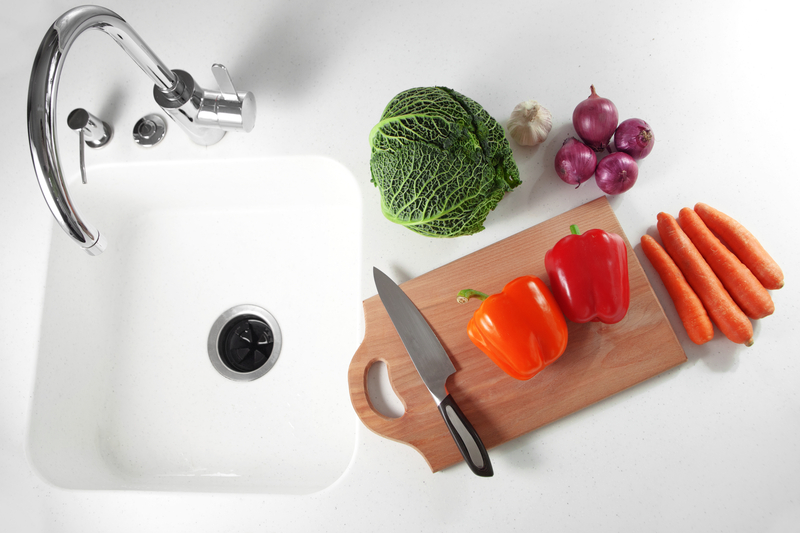
Don’t toss these foods into the sink to keep your garbage disposal running smoothly.
Garbage disposals are so handy for getting rid of unwanted table scraps and unused food bits when cooking. But not everything can go into the disposal without a hitch. Some everyday items can clog it, leading to costly plumbing repairs.
“As a professional plumber with years of experience dealing with the aftermath of misused garbage disposals, I can tell you that many homeowners are unaware of the everyday items that can wreak havoc on their units,” says Miami-based Mehdi Khachani, CEO of JMK Plumbing and HVAC.
Avoid throwing foods from this list into your disposal to keep your kitchen running smoothly.
Oatmeal
One surprising food you shouldn’t put down the garbage disposal is oatmeal. Although the chunky breakfast food may seem to go through the disposal process easily enough when it’s wet, it can damage your disposal when the oatmeal dries. Save your sink and put oatmeal in your compost or trash instead of down the garbage disposal.
“Oatmeal seems to be a material your garbage disposal blades can handle when the oatmeal is wet,” says Joe Hammer, owner of SAK Electric Plumbing Inc. in Phoenix. “The problem is when oatmeal hardens, it gets very hard. Any oatmeal left over in your garbage disposal will harden and damage your disposal blades over time.”
Eggshells
Another common food people throw into their garbage disposals is eggshells. However, those seemingly harmless shells can cause a lot of damage to your disposal, getting stuck to parts and potentially clogging it.
“Eggshells can easily turn into tiny, granular waste which is responsible for clogging pipes,” says Shlomo Cherniak, owner of Cherniak Home Services in Baltimore. “This leads to blockages and even reduces the efficiency of the garbage disposal. The membrane of eggshells wrap around the impellers, causing significant clogs.”
Add your eggshells to the compost or garbage and spare your disposal.
Fibrous Vegetables
Fibrous vegetables can do a number on your garbage disposal, with strands of vegetables getting wrapped around disposal blades. Keep vegetables like celery, corn, and asparagus away from your disposal and instead put them in the compost or garbage.
“Celery is actually a terrible vegetable to put down your garbage disposal, and that seems very innocuous to most homeowners,” says Hammer. “You cannot put celery down your garbage disposal because the stringy celery fibers will wrap around your garbage disposal blades and damage them.”
Bones
Bones may sound obvious to keep out of your garbage disposal, but sometimes people throw small bones in, thinking the smaller size makes the bones harmless. The truth is that any bone size can damage your garbage disposal.
“Even small bones can damage the blades and motor of a garbage disposal, causing it to malfunction or even break down entirely,” Khachani says. Chuck bones into the trash instead.
Coffee Grounds
Coffee grounds may appear small and harmless, but the fragrant remnants of your morning coffee never actually dissolve.
“Instead, the coffee grounds clump together and make a thick paste,” Cherniak says. “This paste gets stuck inside the pipes. It is responsible for clogging and slow drainage.”
Coffee grounds are perfect for composting, however, as they add nitrogen to soil.
Potato Peels
Potato peels are another item to throw in the compost or trash instead of down the kitchen sink. Potatoes are full of starch, which causes the peels to form a thick paste that can stop your pipes.
“There is a lot of starch in potato peels,” Cherniak says. “The starch then turns into a thick, sticky paste which blocks the disposal and chokes your pipes.”
Fruit Pits
Fruit pits are natural food items, but that doesn’t make them safe for your garbage disposal. The hard centers are better for composting than going down the drain, where they can damage the disposal blades.
“Hard pits from fruits like peaches, cherries, or avocados are too tough for the blades to handle and can easily jam or damage the disposal,” Khachani says.
Put your fruit pits in the compost or trash to keep your garbage disposal humming.
Grease and Oil
Anyone who’s cooked with grease or oil knows how it can cause a sticky mess. Although it’s liquid, oil leaves a thick, sticky residue in pipes, which causes a smelly mess of food to get trapped in your disposal.
“A solidified sticky coating is formed when you pour grease or oil down the disposal,” Cherniak says. “This results in blockages and foul odors by trapping all the other debris.”
Dispose of oil and cooking grease in the trash to preserve the health of your garbage disposal.
Pasta and Rice
Also, keep pasta and rice out of your garbage disposal. “Cooked or uncooked pasta and rice usually expand and then swell inside your pipelines when exposed to water,” Cherniak says. “It results in blockages and improper drainage.”
You can compost pasta or rice with some precautionary measures or throw them in the trash.
Marnie Kuntz, Real Simple

